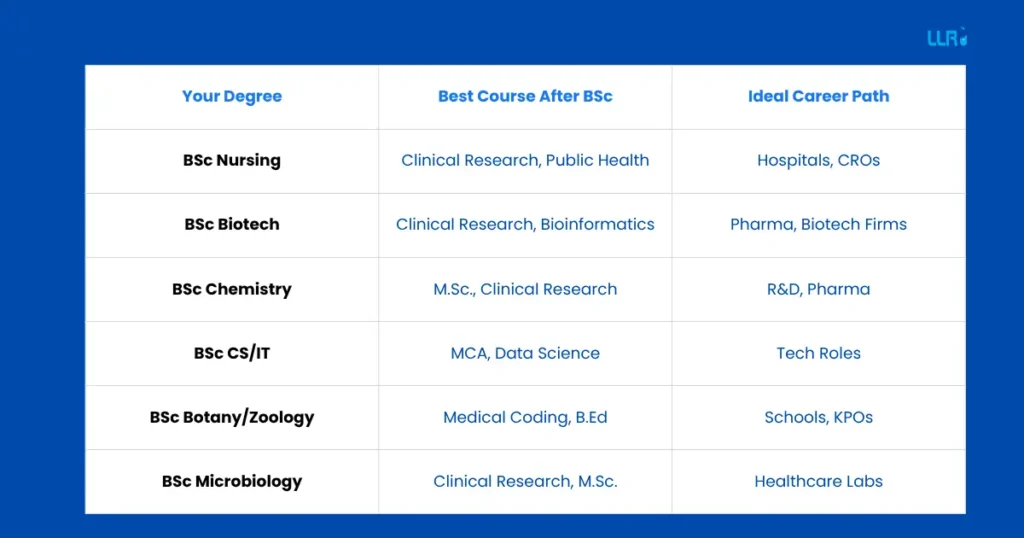What Should I Do After BSc: So, you’ve finally tossed your graduation cap in the air after completing your BSc. First of all, congrats! But now comes the million-rupee question: what should I do after BSc?
Yes, it is true that finishing a BSc is a big deal, whether it’s Chemistry, Biology, IT, or Nursing. But once the excitement fades, the next question naturally follows — And truth be told, there’s no one-size-fits-all answer.
A lot of graduates get stuck here. They see others rushing off to do an M.Sc., some prepping for MBA entrances, and others still trying to figure out what they actually want. It can be overwhelming, and we totally get it.
That’s why this blog is different!
We’re not here to sell you a dream. We’ll talk real options, pros and cons, and introduce you to some practical, job-focused courses offered by Learning Labb Research Institute (LLRI) – a training institute that’s helped hundreds of life science graduates move from confusion to clarity.
It’s completely normal to feel a bit confused. After all, a Bachelor of Science opens up a ton of doors, and choosing the one that fits you best can be tricky. Do you go for a traditional M.Sc.? Try something completely different like an MBA or B.Ed.? Or perhaps dive into industry-ready, job-oriented training programs?
This blog is your go-to roadmap. Especially if your background is in pharma, life sciences, or allied fields like:
- BSc Physics
- BSc Chemistry
- BSc Biology
- Mathematics
- Information Technology
- Computer Science
- Microbiology
- Biotechnology
- Biochemistry
- Botany
- Zoology
- BSc Nursing

Ask Yourself the “Real” Questions
Before you jump into any course, take a minute to think about:
- Do you want to keep studying for another 2–3 years?
- Are you looking to start earning soon?
- Are you interested in research, teaching, corporate jobs, or the healthcare industry?
- Do you want to stay in your subject or explore something new?
Once you’re clear on these, the options start to make a lot more sense.
Read More: Pharmacovigilance Course with Placement in India
What Should I Do After BSc? Let’s Explore Your Options
Whether you’re from BSc Chemistry, Biology, Biotech, Botany, Zoology, IT, Computer Science, Microbiology, Biochemistry, Nursing, or Physics, here’s what you can realistically consider:
1. M.Sc.: For Deeper Subject Knowledge
If you love your subject and want to go deeper, an M.Sc. might be the natural next step. It opens doors in teaching, research, and labs, but only if you’re sure this is the path you want to take.
- Time commitment: 2 years
- Cost: ₹30,000 to ₹1.5 lakh (varies widely)
- Outcome: Mostly academic jobs unless you pursue a PhD or UGC NET
If you’re unsure about research or academia, this may not be the right route. But if you’re genuinely interested, go for it.
2. MBA: If Business, Management or Pharma Sales Interests You
Many BSc grads switch to MBA to get into:
- Pharma marketing
- Healthcare management
- Hospital administration
- General management roles
But let’s be honest; without a strong interest in business or leadership, an MBA can feel disconnected. Also, top B-schools can be expensive, with entrance tests like CAT or MAT needed. MBA is worth it only if you want to lead teams, run projects, or enter the business side of science.
3. MCA: Great for IT and Computer Science Students
If you’re from an IT, CS, or even mathematics background, MCA opens a clear path into tech companies. But it’s not for everyone.
- Best for: Students who genuinely enjoy coding or software
- Duration: 2–3 years
- Outcome: Jobs in development, testing, or analytics
4. B.Ed.: Teaching Science in Schools
Simple route if you love teaching. With a B.Ed. after your BSc, you can become a science teacher in schools (especially in CBSE and ICSE boards). Safe and stable.

5. Clinical Research: A Solid Career Option That’s Often Overlooked
Now, let’s talk about something most BSc students aren’t told about, but probably should be: Clinical Research.
So… What is Clinical Research?
It’s the process of testing new medicines, treatments, or medical devices on humans through clinical trials. It’s a key part of how healthcare innovations go from lab to hospital.
“India’s clinical research market is expected to grow at 8.7% annually through 2030.” – Source: Economic Times Health, 2024
With rising demand for safe drugs and skilled professionals, this industry is expanding fast, and you don’t need a master’s degree to get started.
Why Consider LLRI for Clinical Research?
Learning Labb Research Institute (LLRI) is one of India’s trusted names in life science education. They focus on practical, short-term training that gets students job-ready, not just qualified.
Here’s what you get:
- PG Diploma in Clinical Research (6–12 months)
- Affordable course fees (₹50,000–₹70,000 range)
- Industry-standard clinical research training
- Medical coding & bioinformatics included as add-ons
- Placement support
- Classes from industry experts, not just textbook professors
No fluff, no inflated promises; just job-focused training.
LLRI is also recognized as a clinical research training center by professionals working in CROs, pharma companies, and hospitals.
6. Medical Coding: Quick, Clear Path to a Stable Job
Here’s the thing: Medical coding may not sound glamorous, but it’s in huge demand -especially in cities like Hyderabad, Pune, Chennai, and Bangalore.
- Course Duration: 3–6 months
- Job Profile: Convert medical data into standard codes (used by insurance, hospitals, etc.)
- Salary Range: ₹18,000–₹35,000/month starting
LLRI offers short-term certification courses in medical coding, ideal for BSc Biology, Nursing, Biotech, or Microbiology graduates.
“I completed LLRI’s coding course in 4 months and landed a job in a Chennai-based healthcare BPO right after.” – LLRI alumni
7. Bioinformatics: For Science + Data Lovers
If you’re interested in biology and data, Bioinformatics could be your sweet spot. It’s a growing field combining genetics, computer science, and data analytics.
Great for:
- BSc Biotech
- BSc Biochemistry
- BSc CS + Life Science background
LLRI offers a focused training program in Bioinformatics, including hands-on training with real research tools.
8. Government Jobs & Competitive Exams
Of course, you can always choose the public service route. Some exams to look into:
- UPSC
- SSC CGL
- State-level PSCs
- ICMR, ISRO, BARC Scientific Posts
- Railways, Bank PO
But be aware: These take time, patience, and a backup plan.
So, What Course Should I Do After BSc?
Still asking yourself what should I do after BSc? Let’s summarize based on your background:
| BSc Subject | Ideal Next Step | Why? |
| Biology/Zoology/Botany | Clinical Research, Bioinformatics | Job-oriented, quick to enter healthcare |
| Chemistry | M.Sc. or Clinical Research | Research/Pharma pathways |
| Biotech/Microbiology | Clinical Research, Medical Coding | High demand in CROs |
| Computer Science/IT | MCA or Bioinformatics | Tech + science combos |
| Nursing | Clinical Research, Medical Coding | Adds skills to nursing base |
| Maths | MCA or Data Analytics | Tech industry fit |
Top Reasons to Consider LLRI After BSc
- 100% Industry-Relevant Curriculum
- Clinical Research Training with Placement Assistance
- Flexible Fees Structure
- Faculty from Industry Background
- Recognized Certifications
Confused About What Course Should I Do After BSc? Here’s the Breakdown
It’s probably the most common question students ask after graduation, what course should I do after BSc? And honestly, there’s no one-size-fits-all answer. It truly depends on your background, strengths, and where you want to go.
Let’s simplify it for you:
- If you’re from a Life Science background (Biology, Biotech, Microbiology):
Think about Clinical Research, Medical Coding, or M.Sc. in your core subject. These are in-demand and lead to quick job placements. LLRI offers one of the best industry-focused Clinical Research programs. - If you’re into computers or data (IT, CS, Maths):
Go for MCA, Data Science, or even Bioinformatics if you’re interested in healthcare-tech integration. - If you’re passionate about teaching:
B.Ed. is a straightforward route and in demand across India. - Not sure but want to work in healthcare or pharma?:
That’s where LLRI’s courses come in. Whether you’re asking what course should I do after BSc or how to get job-ready fast, these job-oriented courses are practical, affordable, and industry-recognized.
Let us tell you it in a bit more detail, after all, we are here to help you out!
Career Opportunities After BSc – What’s Really Out There?
After graduation, one of the biggest worries students have is:
“What are the career opportunities after BSc?”
The truth? There are plenty of solid, options, you just need to know where to look.
Whether you’re a BSc graduate in Chemistry, Biotech, Nursing, IT, or Botany, the path you choose next shapes the kind of roles available to you.
Here’s a quick look at some of the top career opportunities after BSc:
1. Research & Development (R&D)
- Ideal for M.Sc. graduates in Chemistry, Biology, or Biotech.
- Roles: Research Analyst, Scientific Officer, Lab Technician
2. Clinical Research & Pharmacovigilance
- A fast-growing industry in India with huge demand for trained professionals.
- LLRI offers one of the best Clinical Research Training Centers in the country.
- Roles: Clinical Research Associate (CRA), Drug Safety Associate
“For life science graduates, clinical research is among the most promising career opportunities after BSc.” – Dr Zeenath, LLRI Training Head
3. IT & Software Roles
- For BSc graduates in Computer Science, IT, or even Maths.
- Career Tracks: Software Developer, Data Analyst, Cybersecurity Specialist
4. Medical Coding & Healthcare KPOs
- Quick entry-level job option with excellent scope.
- LLRI’s Medical Coding Course helps students land roles in 2–3 months.
- Job Roles: Medical Coder, Claims Analyst, AR Executive
5. Bioinformatics
- A perfect match for those who love both data and biology.
- Roles: Bioinformatics Analyst, Computational Biologist, Genomics Data Scientist
6. Education & Teaching
- A go-to career track post B.Ed.
- Roles: School Teacher, Lecturer, Subject Matter Expert
7. Government Sector & Competitive Exams
Scientific research positions in ICMR, DRDO, ISRO are also options for science grads.
Appear for UPSC, SSC, or state-level Public Service Commission exams.
“Asking what course should I do after BSc is the first step. But answering it with research and clarity? That’s where your future begins.” – Sunil, LLRI Career Counsellor

LLRI is considered one of the best institutes for PG Diploma in Clinical Research in India.
On A Final Note…
If you’ve made it this far, you’re already ahead of most. A lot of people just follow the crowd or do what their relatives tell them. But you’re asking real questions. That’s how good careers begin.
So, when you ask: What should I do after BSc? – think about what you want, what you’re good at, and where the opportunities actually are.
Whether it’s Clinical Research, Medical Coding, Bioinformatics, or something else entirely, pick a path that gets you closer to your goal, not just another certificate.
And if you’re still unsure? Talk to US. Reach out to past students. Don’t just trust flashy ads. Ask the hard questions before investing your time and money.
LLRI’s career-focused courses like Clinical Research, Medical Coding, and Bioinformatics are perfect launchpads, especially if you want to start earning quickly, skip the long academic routes, and step into the healthcare or pharma industry. DM us Today!
FAQs
1. What can you do after BSc if you want to start earning soon?
Consider Clinical Research or Medical Coding courses at LLRI. Short duration, practical training, good placements.
2. Which is the best course after BSc for job security?
Clinical Research has been showing excellent long-term potential. Plus, LLRI supports students even after course completion.
3. Is clinical research worth it after BSc?
Absolutely, especially if you’re from a science or healthcare background. It’s a rapidly growing field with real job opportunities.
4. What is the clinical research course fee at LLRI?
On average, ₹50,000–₹70,000 depending on the course and module. Installment options are available.
5. What makes LLRI the best institute for PG Diploma in Clinical Research?
They focus on practical skills, offer placement help, and train you in job-ready tools, not just theory.

